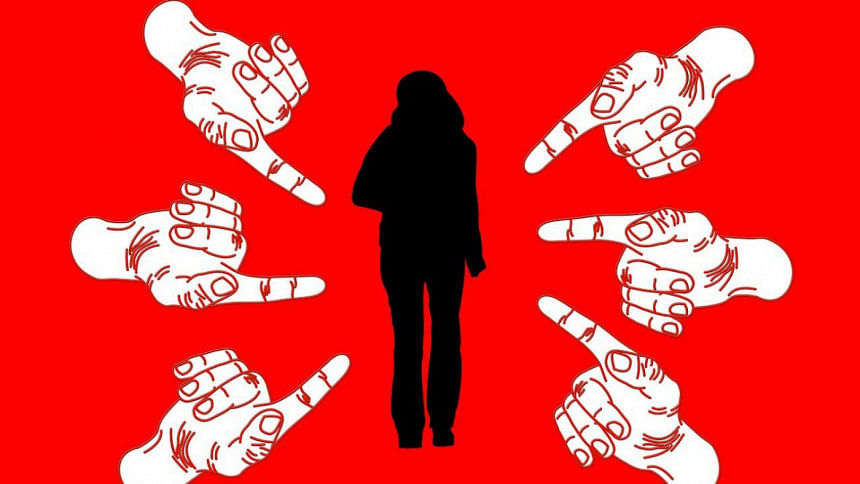The formula of victim-shaming must be ripped to shreds

In my impressionable childhood, my working parents often used to leave me in the care of our adolescent house-help. My day, for the most part, would be spent in her company. I would watch cartoons, she would watch Hindi soaps. That way, at one point, I too began to take interest in her favourite TV serials. I noticed, in one such serial, a woman, who had been raped, was in constant fear regarding her settling down in the future. It stemmed from the uncertainty of getting marriage proposals because of her "scarred" past. This concept was too complex for me to understand at such a young age. I didn't even know what rape meant, let alone the trauma and hostile environment that a woman would have to go through in its aftermath. The house-help "enlightened" me later on. And I clearly remember what she had said: "No one marries a woman who has been raped." "What will happen to her now?" I remember asking. To which she had replied, "Since no one else will marry her, the rapist will have to do it."
And it did happen. The character playing the rapist did marry the woman playing the character of the victim. Of course, she was subjected to torture in her marital life, as portrayed in the serial. And its resemblance to the lived reality of many rape victims was uncanny.
My thoughts would always dwell on what she had said. Even my eight-year-old conscience couldn't make sense of the sick justification that pointed fingers at the victim. But thank God, I was brought up in a proper environment which helped me grasp how wrong her statement was and how a major section of people (mainly in rural areas) still inhale and exhale that same victim-shaming justification.
Now as I think of it, I can't help but stress on the fact that many impressionable kids are being brought up in an environment (especially in uneducated families and rural areas) which is still captive to an inhumane mentality that blames the victim. This mentality, so deeply ingrained in our social fabric, is what has allowed many unjustifiable societal "norms" to bloom, such as treating rape victims as social outcasts.
One of the hardest parts is to change people's mindset. When children enter adulthood and build their own families, holding on to the morally corrupt beliefs that they had grown up with, the toxic mentality of victim-shaming is perpetuated. The shift is tough because, as it is, there are very few possibilities of change that a narrow-minded society presents. A generation growing up on harmful beliefs naturally births a similar generation. Sometimes even the victim herself believes that she is to blame. This is how the formula of victim-shaming and victim-blaming is created.
Look at the women who were violated at the hands of the Pakistani army and their collaborators during Bangladesh's Liberation War; although they were honoured with the title of "Birangana", meaning war heroine, they were treated unfairly by society during the course of their lives later on. Why? Because their bodies were thought to be "impure", and this viewpoint led many of their families to end ties with them. Even though many were taken in by their families with open arms, the society looked at them with disdain. Some fled to India and some committed suicide fearing persecution by their communities.
In Nilima Ibrahim's book "Ami Birangana Bolchi" (As a War Heroine, I Speak), one adolescent Hindu girl seemed reluctant to reach out to her family after being rescued from the camp, because she knew that her family would abandon her, since she had been raped by Muslim men. Many Biranganas were apparently married off, at the cost of dowries. Some marriages ended as the women were subjected to torture, both physical and mental. Some were a bit more fortunate; they got married to men who had willingly come forward and instead of blaming them, embraced them, didn't judge them by their past, and loved them as they would any other human being. But such a mentality in our society was, and still is, rare.
Deeply rooted misconceptions and the resultant norms that subject victims of rape to persecution are not only relevant to us; this social stigma exists everywhere around the world. In Rwanda, the same happened after the genocide. In the Rohingya community too, rape victims are considered a disgrace. In an Al Jazeera article, a midwife in the Kutupalong refugee camp was quoted as saying, "But they should keep quiet and not talk about what happened to them, otherwise people would regard them as tarnished, and cut off their ties with them. In the case of unmarried girls, no one would look at them or consider them for marriage."
Those who shame victims are those who cave in to such a toxic mentality. We need to create a society where more and more people stop subscribing to these misogynistic beliefs. We need more of those with a defiant mindset if we are to uproot this system. No matter how "developed" a nation we become and how much we claim to have "empowered" women, it won't mean anything if rape victims, instead of the perpetrators, are constantly blamed and shamed. We need to create a system where the victims are no longer questioned and ostracised from society. We need to create a system where rapists and their horrific crimes are punished. The age-old formula of victim-shaming must be ripped to shreds.
Shah Tazrian Ashrafi is a regular contributor to Shout,
The Daily Star. Email: [email protected]

 For all latest news, follow The Daily Star's Google News channel.
For all latest news, follow The Daily Star's Google News channel. 



Comments